Part 17: Crusader Kings: Chapter 17 - Bitter Peace: 1197 - 1207
1197 - 1207: Bitter Peace
As the sounds of battle die down across war-torn Germany, King Konstatinos turns his attention back to the family matters. A wife from the influental Ortenburg house is found for his eldest son Isaakios.
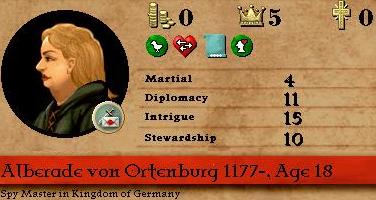
He also takes the time to learn what has happened outside Germany while it was embroiled in war. One piece of news in particular is quite concerning - the Prince of Polotsk has proclaimed himself King of the Orthodox Kingdom of Lithaunia, encompassing Orthodox, Pagan and Catholic lands stretching from Finland to Bohemia.
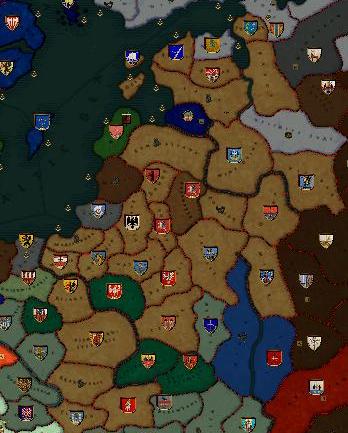
The end of the war does not spell an end to the revolts. Germany is in a full of looted provinces, rebellious vassals and religious unrest, and several minor Counts rise against Konstatinos. The previously so amiable Konstatinos has grown somewhat embiterred from his experiences in the Cathar War, and puts down with the revolts with uncharacteristic vengefulness.
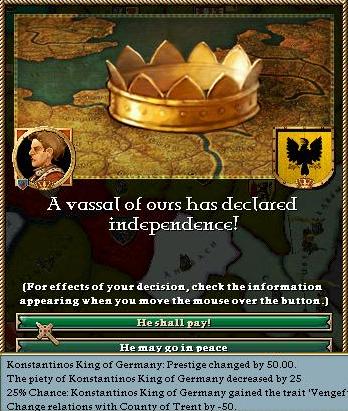
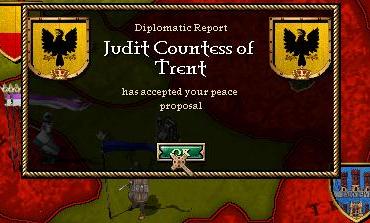
Konstatinos' second son has reached majority. A reasonably skilled diplomat without any outstanding talents, he is made Count of Schwaben.


The powerful Duchy of Brandenburg rises against Konstatinos in 1198.
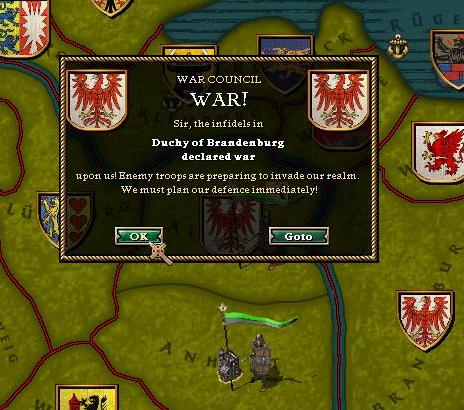
Scraping together every man north of Swabia, Konstatinos enters Anhal with 15,000 men but is soundly defeated in a bloody battle. The Duke of Brandenburg offers Altmark and a large sum of gold in tribute in exchange for peace. Unable to afford another such battle, Konstatinos grudgingly agrees.
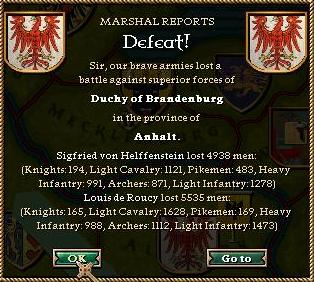

Swabia slowly begins to recover from the ravages of the Cathar armies.

In April of 1199, a number of Barons from across Germany come together to offer their help in rebuilding the war-torn countryside - in exchange for greater privileges and land rights. Konstatinos agrees, even though doing so costs him greatly in standing.

The Grand Duke of Austria, a loyal friend of Konstatinos, is making a bid to be the next King of Germany. Konstatinos grants him the symbolic but highly prestigious title of Duke of Venice to support his bid.

At the beginning of the new century, Isaakios is it Burgundy to work out a few minor border disputes resulting from the peace treaty of 1196. While there, he is introduced to the Princess Irmgard, the eldest daughter of the King of Burgundy. The two fall in love and begin an affair. When news of this reaches Konstatinos, he immediately recalls his son and sternly forbids him from having anything to do with a Cathar girl ever again. Isaakios grudgingly obeys his father, though the matter does much to strain the relations between them.

In winter of the same year, the Burgundian King is wounded in battle whilst leading his army against a rebellious vassal. He quickly takes ill, and the ambitious Duke of Toscana uses his weakness to break free and spark a civil war in Burgundy-Italy. Konstatinos can only helplessly watch on as a golden opportunity glides out of his hands, since bringing Germany into another war so soon would almost certainly fracture the realm completely.

The crusade against Cordoba peters out unsuccessfully in the same year, and in 1202, the Pope decides to try again, this time against Alexandria, which is held by the powerful Kingdom of Egypt. Egypt has managed to bring much of Persia and the Holy Lands under its rule in the last decade, and the King of Egypt has proclaimed himself Caliph. It is rumored that he controls an army of over 200,000 men, more than any christian ruler.
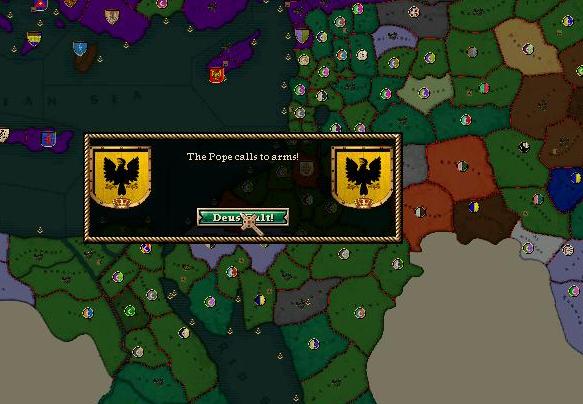
Sporadic risings continue, but they are limited in scope to a few discontent Counts - the Dukes of Germany grumble, but are kept placated with monetary gifts and new privileges.
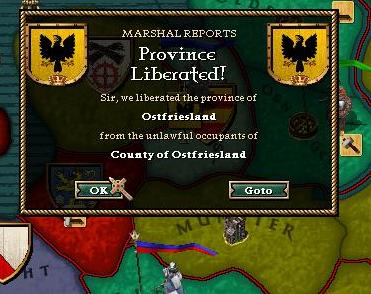
Konstatinos' third and fourth sons reach majority, and are given Baden and Leiningen to rule.
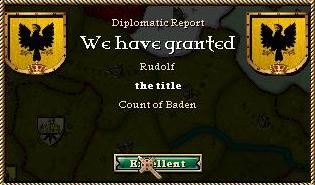
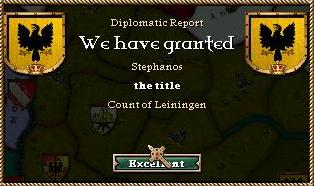
With Konstatinos forty-second birthday in 1203, he feels that the time has come to give Swabia over to his eldest son and prepare Germany for its next ruler, as Emperor Waldemar once did.
Konstatinos' fifth son Andronikos is given Altmark in Brandenburg to rule, establishing a Hohenzollern presence next to the independent Duchy of Brandenburg.

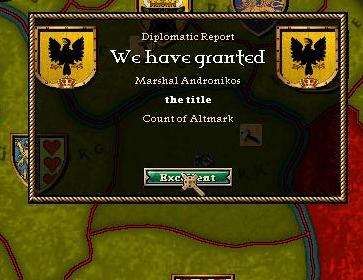
The civil war finally dies down later in the same year.
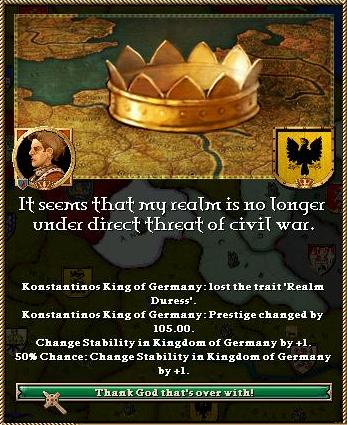
The year turns to 1205. Konstatinos has pacified Germany and secured the future for the dynasty, but he feels that his life's work is unfinished. He needs something to be remembered by other than the Cathar war. He needs a triumph. Germany's armies are still in no shape to fight mighty Egypt, but there is a heathen foe closer to home. The Iberian Kingdom of al-Murabitids has been using Catalan-built ships to raid the coasts of France and England, going so far as to claim several provinces in Saxony and Lorraine.
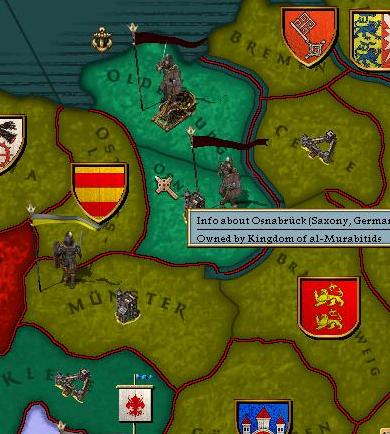
Konstatinos gathers his vassals, and proclaims that the time has come to eject the Muslim dogs from Germany. War is declared in March.
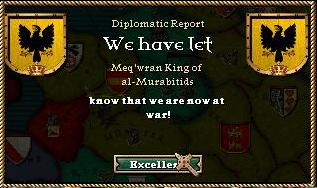
The al-Murabatids are taken completely unprepared as a force of 20,000 North Germans enter Saxony, destroying the tiny garrison and quickly securing control over Osnabruck, Loon and Oldenburg.
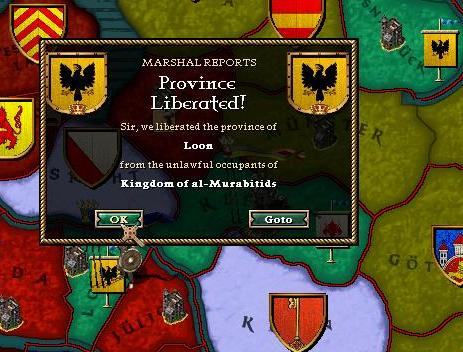
Another 30,000 troops are assembled in three armies in neutral Venice where they set sail for Iberia and North Africa. Duke Isaakios lands with one of the armies in Castellon, marching on Catalayud, the royal seat of the al-Murabatids.

Catalayud falls after a lengthy siege in April of 1206.

An army of 5,000 muslims lands in Saxony in May. Konstatinos leads the defense and throws them back into the sea.
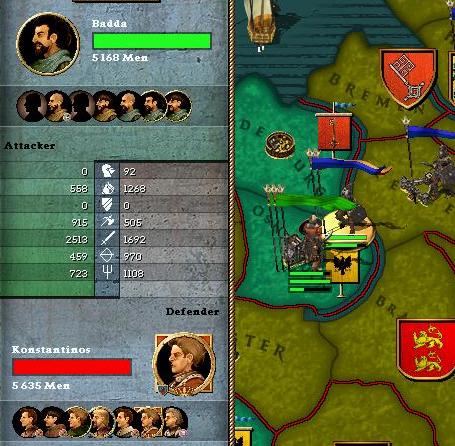
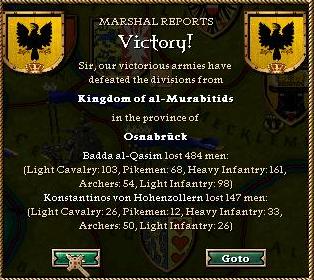
The other two armies sent out of Venice land on the shores of Morroco, and capture the remaining provinces in the al-Murabatid demesne in January of 1207.
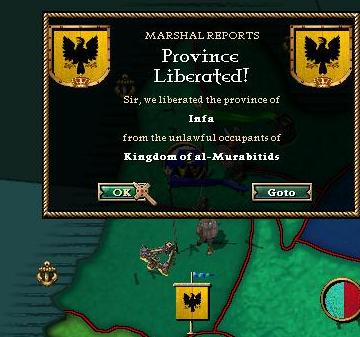
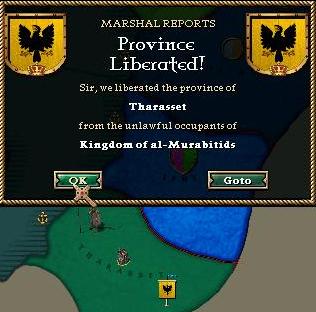
Utterly defeated, the Iberian ruler is forced to make peace in April, ceding all his provinces in Saxony and Lorraine.
